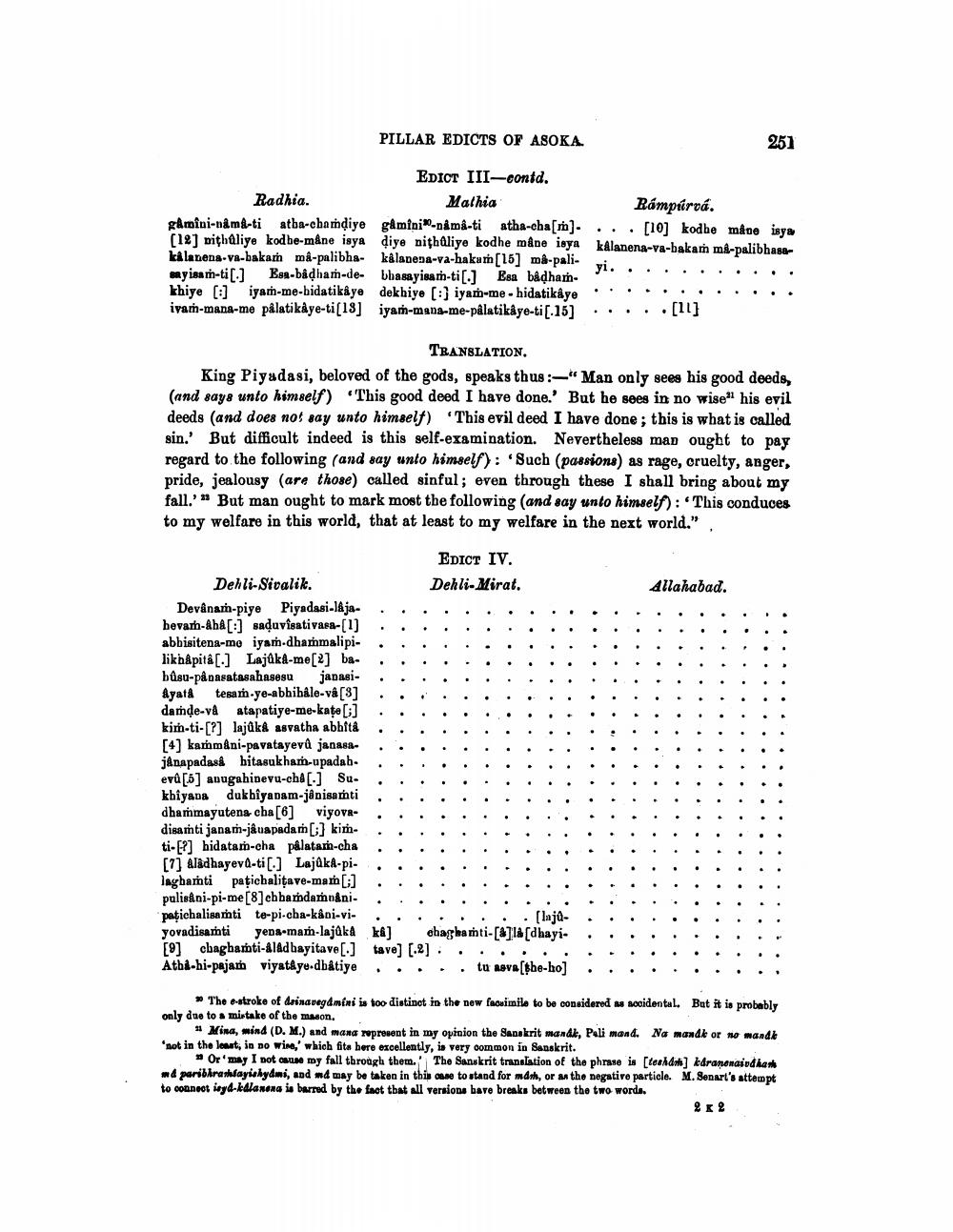________________
Radhia.
PILLAR EDICTS OF ASOKA.
EDICT III-contd.
Rámpártá.
gâmîni-nama-ti atha-chamdiye gamini-nâmâ-ti atha-cha [m]-... [10] kodhe mâne isya [12] mithaliye kodhe-mâne isya diye nithaliye kodhe mâne isya kalanena-va-bakam ma-palibhasakalanena-va-bakam mâ-palibha- kålanena-va-hakam[15] ma-palisayisam-ti[] Esa-bâdham-de- bhasayisam-ti[.] Esa bâdhamkhiye [] iyam-me-bidatikâye dekhiye [:] iyam-me-hidatikâye ivam-mana-me pâlatikâye-ti [13] iyam-mana-me-pâlatikâye-ti[.15]
yi.
Dehli-Sivalik.
Mathia
TRANSLATION.
King Piyadasi, beloved of the gods, speaks thus:-"Man only sees his good deeds, (and says unto himself) "This good deed I have done.' But he sees in no wise his evil deeds (and does not say unto himself) This evil deed I have done; this is what is called sin.' But difficult indeed is this self-examination. Nevertheless man ought to pay regard to the following (and say unto himself): Such (passions) as rage, cruelty, anger, pride, jealousy (are those) called sinful; even through these I shall bring about my fall.'" But man ought to mark most the following (and say unto himself): "This conduces to my welfare in this world, that at least to my welfare in the next world.",
EDICT IV. Dehli-Mirat.
Devânam-piye Piyadasi-lajabevam-âhâ[:] saduvîsativasa-[1] abbisitena-me iyam-dhammalipilikhapitâ[.] Lajuka-me[2] babusu-pânasatasahasesu janasiAyata tesam-ye-abhihâle-vâ [3] damde-va atapatiye-me-kate [;] kim-ti-[?] lajûkê asvatha abhîtâ [4] kammani-pavatayevů janasajanapadasa hitasukham-upadaheva [5] anugahinevu-cha [.] Sukhiyan dukhiyanamdhammayutena cha [6] viyovadisamti janam-jâuapadam [;] kimti-[?] hidatam-cha pâlatam-cha [7] aladhayeva-ti [.] Lajûka-pilaghati patichaliṭave-math[] pulisani-pi-me [8] chhamdamnanipatichalisamti te-pi-cha-kâni-viyovadisamti yena-mam-lajuka ka] [9] chaghamti-âlâd hayitave[.] tave] [.2]. Atha-hi-pajam viyatâye-dhâtiye
. [1]
[lajûehaghamti-[] [dhayi
tu asva [the-ho]
251
Allahabad.
The e-stroke of dainavegamini is too distinct in the new facsimile to be considered as accidental. But it is probably only due to a mistake of the mason.
Mina, mind (D. M.) and mana represent in my opinion the Sanskrit manák, Pali mand. Na mandk or no mandk 'not in the least, in no wise,' which fits here excellently, is very common in Sanskrit.
Or may I not cause my fall through them. The Sanskrit translation of the phrase is [teshdm] karanenaivdham m& paribhramayishydms, and md may be taken in this case to stand for mdmh, or as the negative particle. M. Senart's attempt to connect isyd-kalanena is barred by the fact that all versions have breaks between the two words.
2 x 2




